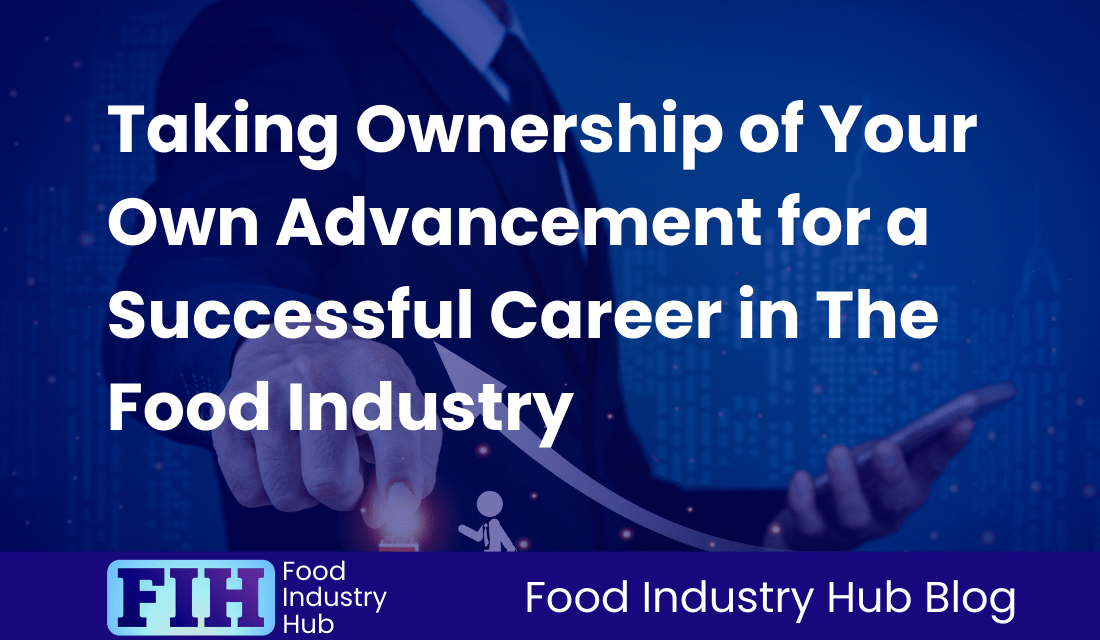Introduction
The food manufacturing industry can offer a really rewarding career for professionals who choose to pursue it.
There is a lot about actively managing your career that can be easy to overlook. Many people assume that spending a series of years working in a profession will lead to success and advancement by virtue of experience and skills developed on the job. This often leads to frustration, as there is an expectation that professionals ready for more senior positions will be able to demonstrate more ownership and intention than what could be perceived as a passive approach to self-development.
In this post, we’ll look at some of the considerations it’s good to have front-of-mind when thinking about your career strategy. We’ll talk about approaches you can take to increase your chances of success, and techniques you can apply when engaging in practical actions for your own progression.
Table of Contents
Do You Have to Have a Degree for A Career in The Food Manufacturing Industry?
Being upfront, there’s no hard and fast rule here. Many job adverts will list a degree among the mandatory requirements. That said, it’s not particularly unusual for professionals to advance into senior positions incrementally, with educational requirements essentially bypassed through expertise built-up over the course of many years and professional achievements. It’s completely viable to have a successful career without higher education.
If you compare a career in the food industry with a range of different professions, the non-essential nature of higher education can seem a little surprising. A medical doctor or psychologist, for example, can only practice within their field if they meet the educational requirements and accumulate specific/targeted continual professional development hours to demonstrate competency. By contrast, in the food industry it is possible to enter the profession at entry level and advance to senior management without any advanced training or education.
That acknowledged, a degree can help you to meet entry requirements, and will make it a lot easier to access a broader range of opportunities. In terms of supply and demand, there are a lot of candidates who can boast higher education and professional qualifications – so it’s going to be difficult (but not impossible) to compete in the job market for certain roles if you don’t have that certificate.
Whether or not you need a degree for a career in the food manufacturing industry depends on the specific role you’re interested in and the company’s requirements. The food manufacturing industry is diverse, encompassing a wide range of positions with varying educational prerequisites. Here are some factors to consider:
Entry-Level Positions – Many entry-level positions in food manufacturing, such as production workers, machine operators, and quality control inspectors, may not require a college degree. These roles often prioritise skills, experience, and on-the-job training over formal education.
Technical Roles – For positions that involve technical skills or specialised knowledge, such as food safety and quality assurance, process engineering, or food science and technology, a degree in a related field can be beneficial or even required. A bachelor’s or master’s degree may be necessary for roles that involve research, development, or management.
Regulatory Requirements – Some roles in food manufacturing may be subject to regulatory requirements. For example, individuals responsible for food safety and quality assurance may need to meet specific educational and certification criteria to comply with food safety regulations. This will depend on the regulatory framework in the applicable country, but one example would be HACCP training/competence for members of the HACCP team.
Career Advancement – While you may be able to start in the food manufacturing industry without a degree, having one can enhance your career prospects and open up opportunities for advancement into managerial or specialised roles.
Company Policies – Different companies may have varying hiring criteria. Some may value experience and skills more than formal education, while others may have strict degree requirements.
Specialised Certifications – In addition to formal degrees, some positions in the food manufacturing industry may require or benefit from specialised certifications related to food safety, quality control, or specific processes.
The particular discipline you choose to pursue will have a significant bearing on the extent to which you might benefit from having a degree. If you aspire to be an operations manager or site manager, for example, an MBA (Master of Business Administration) may give you substantial credibility over a candidate without higher education – but there are many people throughout the industry who have achieved those positions on the strength of their experience alone. Some companies may impose educational requirements as selection criteria or limitations on career progression, however – so you shouldn’t take it for granted that all options will be open to you without higher education and formal qualifications.
Food manufacturing shares many of the features of any manufacturing industry, and career paths spanning logistics, accounts, purchasing, operations, etc will tend to follow conventions that exist across broad manufacturing sectors. More vocational career paths in the food industry (such as quality, technical, and product development roles) are likely to require a food science or related degree. There are plenty of exceptions, but realistically, any selection of job adverts will quickly show that having a food science degree is a pretty clear advantage.
The educational requirements for a career in the food manufacturing industry can vary widely depending on the role and the employer. It’s essential to research specific job postings, companies, and industry trends to understand the expectations for the position you’re interested in. Additionally, networking, gaining relevant experience, and pursuing certifications can also help you build a successful career in this industry, even if you don’t have a formal degree.

Best Practices for Maintaining a Compelling CV
Your CV is the most important document that you can use to market yourself for professional opportunities.
The same best practices for writing a CV for any sector will serve you well in the food industry. You want to be clear and concise, so any prospective employer can quickly see how your skills and experiences match their requirements. If a recruiter has a lot of candidates to shortlist from, you get very little time to demonstrate suitability – so it’s better to put your strengths across quickly and effectively than to use a lot of flowery language and long paragraphs.
The quality of your CV will probably determine whether or not you are shortlisted – so you can think of it as a marketing document that recruiters and hiring managers will use to decide whether or not it’s worth committing the time to an interview with you. With this in mind, you can be very targeted about the details you include for each application.
Maintaining a compelling CV (Curriculum Vitae) as a professional in the food manufacturing industry is crucial for showcasing your qualifications and experiences to potential employers. While the particular content of your CV should evolve according to your level of seniority and the requirements of the position you’re interested in, there are some universally applicable best practices. Keep the following things in mind when editing your CV:
Clear Formatting and Organisation – Use a clean, professional format with consistent fonts and bullet points for easy readability. Organise your CV into sections, including contact information, summary or objective, education, work experience, skills, certifications, and relevant achievements.
Contact Information – Include your full name, professional email address, phone number, and LinkedIn profile (if applicable). Ensure your contact details are up to date.
Professional Summary or Objective – Write a concise, well-crafted summary or objective statement at the beginning of your CV. This should highlight your career goals, key skills, and what you bring to the table.
Education – List your educational background, including degrees earned, institutions attended, graduation dates, and any honours or awards. If you have relevant coursework or research projects, mention them.
Work Experience – Detail your work experience in reverse chronological order (most recent job first). Include the job title, company name, location, and employment dates for each position. Use bullet points to describe your responsibilities, achievements, and contributions in each role. Highlight specific accomplishments, such as process improvements, cost savings, or successful projects. Emphasise any leadership roles or responsibilities you held.
Skills – Create a skills section to showcase your technical and soft skills. Include skills related to food manufacturing, such as quality control, food safety, production processes, and any relevant software or tools. Mention language proficiency or any specialised certifications.
Certifications and Training – List relevant certifications, training programs, and workshops related to food manufacturing or your specific field. Include the name of the certifying body and the date of certification.
Professional Associations and Memberships – Mention any memberships in industry-related associations, such as the Institute of Food Technologists (IFT) or the American Society of Quality (ASQ).
Publications and Presentations – If applicable, include any publications, research papers, or presentations you’ve authored or contributed to in the field.
Achievements and Awards – Highlight any awards, recognitions, or honours you’ve received during your career.
Tailor Your CV – Customise your CV for each job application by emphasising the skills and experiences most relevant to the specific position. Use keywords from the job description to demonstrate your alignment with the role.
Proofread and Update Regularly – Ensure your CV is free of errors in spelling, grammar, and formatting. Regularly update your CV to reflect new skills, certifications, or experiences.
References – Include a note indicating that references are available upon request. Avoid listing references directly on the CV.
Length – Aim for a CV that is concise but comprehensive. In most cases, 1-2 pages are sufficient, but senior professionals with extensive experience may have longer CVs.
Feedback – Seek feedback from colleagues, mentors, or career advisors to improve your CV’s content and presentation.
Remember that a compelling CV is a dynamic document that should evolve as your career progresses. Regularly update it to reflect your latest achievements and skills, and customise it to align with your career goals and the specific job opportunities you pursue.

Sign-up for the Food Industry Hub Mail Service
We regularly produce new content for food industry professionals, and the Food Industry Hub Mail Service is the best way to stay up to date with the latest additions.
Signup today to be added to the Food Industry Hub mailing list.
Advocating For Yourself and Your Own Career Success
Self-advocacy is a skill that is all too often overlooked.
Advocating for yourself is all about communicating outwardly in a way that helps you to move toward your objectives and achieve the things you’re trying to accomplish.
If there are gatekeepers or decision-makers who can influence whether (or how quickly) you progress toward your goals, then you will need to make those people aware of your targets and persuade them that there is good reason to assist you in moving forwards. So, advocating for yourself isn’t just ‘asking for stuff’ – it’s a staged activity centred around self-promotion and negotiation. You can think about self-advocacy as following the below sequence:
1 – Decide exactly what your objectives are. It could be a pay raise, a promotion or role change, it could be mentorship, or an unlimited range of aspirations that you have. Regardless of your particular goals, you need to be clear in your own mind about what your objectives are.
2 – Identify decision-makers or influential people who can help or hinder your success. Who do you need to advocate to?
3 – Form a persuasive argument that would make it mutually beneficial for those people to help you. Most of the time it would be irrational to expect people to act on your behalf just because you tell them what you want – so you need to be able to present a persuasive reason for why these influencers should want to help you. Keep in mind, people are always motivated to act in their own interests.
4 – Engage in the communicative process and advocate for yourself.
Sometimes, advocating for yourself will take the form of one-on-one conversations and you get a lot of opportunity to engage in a dialogue with the people you’re advocating to. Sometimes, self-advocacy can be a bit more like marketing yourself through broadcasting mediums including LinkedIn and other forums – where communication is more one-directional. In any event, you can use the following tactics to advocate for yourself and your career goals:
Set Clear Career Goals – Begin by defining your career objectives and long-term goals within the food manufacturing industry. Knowing where you want to go is essential for advocating effectively.
Regularly Assess Progress – Periodically evaluate your career progress and achievements. Reflect on what you’ve accomplished and identify areas where you can improve or grow.
Seek Feedback – Actively request feedback from supervisors, colleagues, mentors, and peers. Constructive criticism can provide insights into areas for development.
Document Achievements – Keep a record of your accomplishments, certifications, and training. Maintain a portfolio of your work and contributions to the industry.
Build a Personal Brand – Cultivate a strong personal brand that reflects your expertise and professionalism in the food manufacturing sector. Establish yourself as an industry thought leader.
Communicate Your Value – Clearly articulate your skills, experiences, and contributions to your current or potential employers. Showcase how you’ve added value and solved problems in previous roles.
Network Actively – Network both within and outside your organisation. Attend industry events, join professional associations, and engage with colleagues on social media platforms like LinkedIn.
Leverage Mentoring Relationships – If you have mentors or advisors, seek their guidance in advocating for your career. They can offer valuable insights and advice.
Self-Promotion in the Workplace – Don’t shy away from promoting your accomplishments within your organisation. Share your achievements in team meetings and discussions when relevant.
Be Proactive in Seeking Opportunities – Actively seek out opportunities for growth and advancement within your current organisation. Express your interest in taking on new responsibilities or projects.
Pursue Continuous Learning – Invest in ongoing education and professional development. Acquiring new skills and knowledge demonstrates your commitment to career growth.
Stay Informed – Keep up with industry trends, technological advancements, and regulatory changes. Being informed positions you as a knowledgeable professional.
Advocate for Fair Compensation – Don’t hesitate to discuss compensation and benefits with your employer. Research industry salary benchmarks and advocate for fair and competitive packages.
Participate in Industry Conversations – Contribute to industry discussions and forums. Write articles or blog posts, participate in webinars, and attend panel discussions related to food manufacturing.
Volunteer for Leadership Roles – Seek out leadership opportunities within professional associations or industry groups. These roles can enhance your visibility and credibility.
Support Others – Advocate for colleagues and team members when you recognise their contributions. Building a culture of mutual support can benefit everyone’s career growth.
Confidence and Assertiveness – Advocate for your career with confidence and assertiveness. Believing in your abilities and worth is crucial to gaining the support of others.
Build Relationships with Decision-Makers – Foster positive relationships with key decision-makers in your organisation. Having influential advocates can significantly impact your career trajectory.
Strategic Communication – Communicate your career goals and aspirations with clarity. Discuss your development plan with supervisors and seek their support.
Celebrate Achievements – Acknowledge and celebrate your successes along the way. Recognising your accomplishments can boost your confidence and motivation.
Remember that the act of self-advocacy doesn’t guarantee you of the outcomes you want, and you should be prepared to handle disappointment gracefully. Even so, you miss every shot you don’t take – so there’s never a good reason to shy away from promoting your interests.
Advocating for oneself and one’s career is an ongoing process that requires self-awareness, confidence, and strategic planning. By actively promoting your skills and contributions, seeking opportunities for growth, and cultivating a strong professional network, you can position yourself for success and advancement in the competitive food manufacturing industry.

Writing a Cover Letter for A Job Application
Especially in situations where there is a lot of competition for an advertised position, a cover letter can be quite a good way to differentiate yourself from other candidates.
Almost all job seekers treat the applications process as a numbers game. Job boards make it easy to send hundreds of applications – each only requiring a few clicks to send an attached CV. The majority of job postings are generic with relatively little detail about the position (so that recruitment agencies can control the identity of the employer and discourage direct applications), so most applications are made with very little personalisation. Because of this, the simple act of writing a cover letter can set your application apart from the pile of competing generic applicants.
You can think of this as a method for signalling to the employer that this position is of particular interest to you. The fact that you’ve gone to the effort of writing a cover letter shows that you are enthusiastic about this specific opportunity, and it wasn’t just another few clicks amongst a sea of applications.
Now, this only works if it’s a genuine expression of interest and enthusiasm. A copy-and-paste cover letter with the job title switched out isn’t going to have the intended effect. But if you do see a job advert that really grabs your attention, you should invest the time and effort into writing about why this would be such a good fit.
A cover letter can be quite a simple and straight-forward explanation of what attracts you to the role, and what you have to bring to the position. The main thing is to impress upon the recruiter that you are enthusiastic about the opportunity and have gone to a bit of extra effort in the way you’re approaching the application. For a bit of structure, you can keep the following points in mind when you’re drafting a cover letter:
Customise Each Cover Letter – Tailor your cover letter for each job application. Mention the company’s name, the specific position you’re applying for, and any other relevant details from the job listing. Highlight why you are a strong fit for that particular role and company.
Concise and Professional Format – Use a professional and business-like format for your cover letter. It should be well-structured, with clear paragraphs and no spelling or grammatical errors. Keep the cover letter to one page in length.
Addressing the Hiring Manager – Whenever possible, address the cover letter to a specific hiring manager or recruiter by name. Avoid generic greetings like “To Whom It May Concern.”
Opening Paragraph – Start with a compelling opening paragraph that grabs the reader’s attention. Mention how you heard about the job, if applicable, and express your enthusiasm for the role and the company.
Highlight Your Relevant Experience – Discuss your relevant work experience and achievements in food manufacturing. Explain how your past roles have prepared you for the job you’re applying for. Use specific examples to demonstrate your skills and accomplishments.
Emphasise Your Skills – Discuss your technical and soft skills that are relevant to the job. In the food industry, skills related to quality control, food safety, process improvement, and teamwork are often valued.
Show Knowledge of the Company – Demonstrate that you have researched the company by mentioning its values, mission, products, or recent achievements. Explain why you are interested in working for this specific organisation.
Align with Job Requirements – Address the specific requirements and qualifications outlined in the job posting. Explain how your skills and experiences align with these requirements.
Highlight Achievements – Mention any notable achievements, such as cost savings, process improvements, or successful projects, that showcase your contributions in previous roles.
Express Enthusiasm and Fit – Clearly convey why you are passionate about working in the food industry and how you see yourself contributing to the company’s success. Explain why you believe you are a strong cultural fit for the organisation.
Closing Paragraph – Summarise your interest in the position, reiterate your enthusiasm, and express your eagerness to discuss your qualifications further in an interview. Provide your contact information for follow-up.
Professional Sign-Off – Use a professional sign-off, such as “Sincerely” or “Best regards,” followed by your typed name and handwritten signature if submitting a physical cover letter.
Proofread and Edit – Carefully proofread your cover letter for errors in grammar, spelling, and punctuation. Mistakes can make a negative impression.
Formatting and Layout – Use a clean, readable font and standard margins. Ensure that the formatting matches your resume.
Remember that your cover letter is an opportunity to make a strong first impression and showcase your enthusiasm and qualifications for the position. It should complement your resume and provide a personalised narrative of why you are the right candidate for the job.
Use Social Media Platforms Like LinkedIn to Market Yourself as A Professional
Platforms like LinkedIn and sector-specific forums present a very clear opportunity to network at scale. The possibilities are pretty far reaching, with the availability of groups, interactive webinar type events, and collaborative articles to contribute into.
Historically, most professionals on LinkedIn were fairly inactive – the point was to be registered and discoverable by head-hunters. By contrast, recruiters and B2B salespeople represented the majority of active users.
More recently, the platform dynamics have evolved so that individual professionals have become more engaged. This benefits everyone, because a community that’s more active overall has more to offer all participants.
As a professional in the food industry, it’s well-worth staying ahead of developments in professional networking across your peer group. The alternative to an active online presence is obscurity. Even if you only have superficial online relationships, it’s far better to have a name and profile that people recognise than to be absent from the professional network.
Being active on social media for professional networking can have real practical advantages. If you apply for a job, wouldn’t it be better for the hiring manager to say, “Oh yeah, I know them. They keep sharing recall alerts and RASFF updates on LinkedIn” than “Never heard of them”? Just being recognisable is quite a significant thing.
To really get the most out of online professional networking, you should engage regularly and make full use of the platform.
Here are some strategies to leverage LinkedIn for professional branding in the food manufacturing sector:
Complete Your Profile – Ensure your LinkedIn profile is complete and up to date. Include a professional photo, a compelling headline, a well-written summary, and details of your work experience and education.
Use a Professional Headline – Craft a headline that reflects your current role and expertise. Avoid generic titles and use keywords relevant to the food manufacturing industry.
Create a Compelling Summary – Write a concise but engaging summary that highlights your skills, experiences, and passion for the food manufacturing field. Showcase your unique value proposition and what sets you apart from others in your industry.
Highlight Relevant Skills – List your skills and expertise related to food manufacturing, such as quality control, food safety, process improvement, or specific technical skills. Ask colleagues and connections to endorse your skills.
Showcase Achievements – Use the “Experience” section to detail your achievements, responsibilities, and contributions in your previous roles within the industry.
Quantify your accomplishments whenever possible (e.g., “Improved production efficiency by X%”).
Engage in Content Sharing – Share relevant articles, news, and insights related to the food manufacturing industry. This positions you as knowledgeable and keeps your network informed. Comment on and like posts from others in your field to build connections.
Create Original Content – Share your thoughts and expertise through original posts, articles, or videos. You can discuss industry trends, share success stories, or offer tips and advice. Use visuals and multimedia to make your content more engaging.
Participate in Groups – Join LinkedIn groups related to food manufacturing, quality control, or other relevant topics.
Engage in discussions, ask questions, and share your insights to establish yourself as an industry authority.
Network Strategically – Connect with colleagues, mentors, industry professionals, and peers in your network.
Personalise connection requests by mentioning common interests or experiences.
Recommendations and Endorsements – Request recommendations from colleagues or supervisors who can speak to your skills and work ethic. Endorse the skills of your connections, and they may reciprocate.
Attend Webinars and Virtual Events – Participate in online industry events and webinars, and share your takeaways and thoughts with your network afterward.
Job Searching and Opportunities – Keep an eye on job postings in the food manufacturing industry and follow companies you’re interested in. Engage with recruiters and hiring managers.
Maintain a Professional Tone – Ensure your interactions and comments maintain a professional and positive tone.
Avoid sharing controversial or sensitive topics that could negatively impact your professional image.
Consistency and Regular Updates – Maintain an active presence on LinkedIn by regularly sharing content, updating your profile, and engaging with your network.
Monitor Your Analytics – Use LinkedIn analytics to track the performance of your posts and profile views. Adjust your strategy based on what works best for you.
By using LinkedIn effectively, professionals in the food industry can establish themselves as industry experts, expand their networks, and stay updated on industry trends and opportunities. LinkedIn serves as a valuable tool for personal branding and career advancement in this field.

Actively Market Yourself as Professional
In economic terms, an employee sells their labour (in units of time) to their employer. Your capabilities are your product, and when you enter the job market you are literally marketing yourself.
The way you market yourself will determine whether you are viewed as a commodity item – interchangeable with any number of alternative professionals able to carry out the same function – or if you are differentiated by your personal brand.
Let’s be clear – you don’t want to be undifferentiated commodity labour.
When you market yourself effectively, you can increase the demand for your services and potentially improve your earning potential – all based solely on your reputation and personal brand.
Marketing yourself as a professional in the food manufacturing industry involves proactive steps to establish your expertise, build your network, and create a strong personal brand. Here are some strategies you can use to actively market yourself as a professional:
Build a Strong Online Presence – Create a professional website or blog to showcase your expertise, share industry insights, and provide a platform for your personal brand. Maintain an active and professional presence on social media platforms, particularly LinkedIn.
Content Creation – Share your knowledge and insights through various content formats such as articles, blog posts, videos, and webinars. Create content that addresses industry challenges, offers solutions, and highlights your expertise.
Networking – Attend industry conferences, trade shows, and networking events to meet fellow professionals, potential mentors, and employers. Join relevant associations and organisations, and actively participate in their activities.
Speaking Engagements – Seek opportunities to speak at industry events, webinars, or workshops. Sharing your expertise as a speaker can establish you as a thought leader in your field.
Publish Research or Case Studies – If applicable, conduct research or publish case studies related to food manufacturing. Share your findings with the industry through journals, websites, or conferences.
Collaborate with Peers – Collaborate on projects, research, or presentations with colleagues in your field.
Joint efforts can expand your reach and credibility.
Continuous Learning – Stay updated with the latest industry trends, technologies, and best practices through courses, workshops, and certifications. Demonstrate your commitment to professional growth.
LinkedIn Engagement – Regularly update your LinkedIn profile with achievements, projects, and new skills.
Engage with your network by sharing relevant content, participating in discussions, and offering insights.
Seek Mentoring and Coaching – Consider seeking guidance from experienced professionals in the food manufacturing industry. A mentor can help you navigate your career and provide valuable insights.
Promote Your Achievements – Don’t be shy about sharing your accomplishments and successes within your network and on your personal website or LinkedIn profile.
Online Courses and Webinars – Host webinars or online courses related to food manufacturing topics you are knowledgeable about. These can help you establish authority and generate interest in your expertise.
Consulting or Freelancing – Offer consulting services or freelance work in your area of expertise. Building a portfolio of successful projects can boost your professional reputation.
Volunteer and Industry Involvement – Volunteer for leadership roles in industry associations or non-profit organisations. Active involvement demonstrates your commitment to the field.
Market Your Soft Skills – Highlight soft skills such as leadership, communication, problem-solving, and teamwork, which are valuable in any professional setting.
Collect and Showcase Testimonials – Request recommendations or testimonials from colleagues, supervisors, or clients who can vouch for your skills and work ethic.
Online Portfolio – If possible, create an online portfolio showcasing your work, projects, and achievements in the food manufacturing industry.
Be Authentic and Consistent – Stay true to your values and professional identity. Consistency in your messaging and actions builds trust.
Feedback and Adaptation – Be open to feedback and adapt your marketing strategies based on what works best for you and your audience.
Active self-marketing in the food manufacturing industry is an ongoing process that requires dedication and persistence. By consistently showcasing your expertise, building your network, and maintaining a strong online presence, you can enhance your professional reputation and create opportunities for career growth.

Engage With Job Boards for Optimum Career Success
Engaging with job boards effectively can be a valuable strategy for professionals in the food manufacturing industry to advance their careers. Here are some tips to help you make the most of job boards for optimum career success:
Identify Reputable Job Boards – Start by identifying reputable job boards that specialise in food manufacturing or related industries. Some popular job boards include Indeed, LinkedIn Jobs, Monster, Glassdoor, and specialised industry-specific boards like FoodJobs and CareersInFood.
Create a Strong Profile – On job boards that allow you to create profiles, ensure that your profile is complete, accurate, and up to date. Highlight your skills, experience, and accomplishments. Use a professional photo and craft a compelling headline and summary.
Set Up Job Alerts – Most job boards offer the option to set up job alerts based on your preferred criteria (e.g., job title, location, keywords). Use this feature to receive notifications about relevant job openings in real-time.
Optimise Your Resume – Tailor your resume for each application, aligning it with the specific job posting. Highlight relevant skills and experiences. Use keywords from the job description to increase the visibility of your resume to employers and recruiters.
Apply Strategically – Don’t apply to every job you come across. Instead, focus on positions that closely match your qualifications and career goals. Customise your cover letter and application materials for each job application.
Network on LinkedIn – Use LinkedIn in conjunction with job boards. Connect with professionals in your industry, join relevant groups, and follow companies of interest. Leverage your network to learn about job opportunities that may not be posted on job boards.
Research Employers – Before applying to a job, research the hiring company. Understand its culture, values, products, and reputation in the industry. Tailor your application to demonstrate your genuine interest in the organisation.
Leverage Referrals – If you have connections within a company you’re interested in, consider asking for a referral. Employee referrals can often expedite the hiring process.
Prepare for Interviews – Be ready for interviews by researching common interview questions in the food manufacturing industry. Highlight your relevant skills and experiences. Practice your interview responses with a trusted friend or mentor.
Follow Up – After submitting an application or attending an interview, send a polite follow-up email expressing your continued interest in the position.
Be Responsive – Check your email and job board notifications regularly. Respond promptly to interview requests, questions, and correspondence from potential employers.
Stay Persistent – Job searching can be competitive and sometimes time-consuming. Stay persistent, and don’t get discouraged by rejections or delays.
Professional Development – While job hunting, invest in professional development. Consider taking courses or certifications that can enhance your qualifications and make you a stronger candidate.
Manage Your Online Presence – Ensure that your online presence, including your social media profiles, reflects professionalism and aligns with the image you want to project to potential employers.
Track Your Applications – Keep a record of the jobs you’ve applied to, the status of each application, and any feedback received. This can help you stay organised and follow up effectively.
Remember that job boards are just one tool in your job search toolkit. A comprehensive approach that includes networking, professional development, and a well-crafted resume can significantly increase your chances of finding the right opportunity in the food manufacturing industry.

Engage With Learning and Development Resources and Training Providers
The acquisition of new skills through learning and development resources is a key method for adding value to yourself as a professional. It will help you to achieve career mobility and improve your earning potential.
The following resources are featured in our post on training and development – and will be of interest to any career-oriented professional in the food industry:
Engaging in learning and development is essential for professionals working in the food manufacturing industry to stay competitive, advance their careers, and achieve optimum success. Here are strategies to help you make the most of learning and development opportunities:
Identify Career Goals – Define your long-term career goals within the food manufacturing industry. Knowing where you want to go will help you target relevant learning opportunities.
Continuous Learning Mindset – Embrace a mindset of continuous learning. Recognise that the industry evolves, and staying up to date is crucial. Stay Informed. Regularly read industry publications, books, and research reports to stay informed about the latest trends, technologies, and best practices in food manufacturing.
Industry-Specific Courses – Enrol in industry-specific courses and workshops related to food safety, quality control, production processes, regulatory compliance, and emerging technologies. Consider online platforms, universities, and professional organisations that offer relevant training.
Certifications – Pursue certifications that are relevant to your field, such as HACCP (Hazard Analysis and Critical Control Points), SQF (Safe Quality Food), or Six Sigma for process improvement. These certifications can enhance your qualifications and demonstrate expertise to employers.
On-the-Job Training – Seek out opportunities for on-the-job training and mentorship. Learning from experienced colleagues can be highly valuable.
Conferences and Seminars – Attend industry conferences, seminars, and trade shows. These events provide opportunities for networking, learning about the latest industry innovations, and gaining insights from experts.
Join Professional Associations – Become a member of professional associations relevant to food manufacturing, such as the Institute of Food Technologists (IFT) or the American Society of Quality (ASQ).
Participate in their events, webinars, and committees.
Online Learning Platforms – Utilise online learning platforms like Coursera, LinkedIn Learning, edX, and Udemy to access a wide range of courses and tutorials on relevant topics.
Seek Feedback – Request feedback from supervisors, colleagues, or mentors to identify areas for improvement and prioritise your learning goals accordingly.
Set Aside Dedicated Time – Allocate time in your schedule specifically for learning and development activities. Consistency is key to effective skill-building.
Mentoring and Coaching – Consider seeking a mentor or coach who can provide guidance, share insights, and offer career advice specific to your industry.
Peer Learning – Collaborate with peers and colleagues on projects or knowledge sharing. Peer learning can provide different perspectives and solutions to common industry challenges.
Experiment and Apply Knowledge – Apply what you’ve learned in your day-to-day work. Experiment with new techniques or processes and track the results.
Stay Ethical and Responsible – Prioritise ethical considerations and responsible practices in your learning and development efforts, especially in an industry focused on food safety and quality.
Stay Adaptable – Be prepared to adapt to changes in the industry, including shifts in technology, regulations, and consumer preferences. A willingness to learn and adapt is a valuable trait.
Measure Progress – Regularly assess your progress by tracking your learning objectives and setting new ones as you achieve milestones.
Document Achievements – Keep a record of your certifications, training, and accomplishments. This documentation can be valuable when seeking new opportunities or promotions.
By actively engaging in learning and development, you can position yourself as a valuable asset in the food manufacturing industry, stay competitive, and continuously advance your career. It’s a dynamic field, and those who invest in their professional growth are better equipped to excel and lead within it.

Address Fixed Mindset and Growth Mindset Enhanced Career Success
A fixed mindset assumes that you are good at the things you are currently good at, and you will remain bad at the things you are bad at. A growth mindset assumes that skills are developed, and you can grow into any competency.
Addressing and cultivating a growth mindset is crucial for professionals working in the food manufacturing industry to achieve optimum career success. A growth mindset fosters a willingness to learn, adapt, and overcome challenges, which is essential in an industry that continually evolves. Here’s how professionals can work on developing a growth mindset:
Recognise the Fixed Mindset – The first step is to acknowledge if you tend to have a fixed mindset. Fixed mindset beliefs often manifest as a fear of failure, avoidance of challenges, and reluctance to learn new skills.
Embrace Challenges – View challenges and setbacks as opportunities for growth. Rather than avoiding difficult situations, approach them with the mindset that they provide valuable learning experiences.
Emphasise the Process, Not Just Results – Focus on the journey of learning and improvement rather than solely fixating on the end results. Understand that setbacks are part of the process.
Develop a Love for Learning – Cultivate a genuine passion for learning new things. Seek out knowledge and opportunities to expand your skillset in the food manufacturing field.
Set Learning Goals – Establish clear learning goals that align with your career aspirations. These goals can help guide your professional development.
View Criticism Constructively – Accept constructive criticism as a means to improve rather than as a personal attack. Use feedback as a tool for growth.
Learn from Mistakes – When you make mistakes, instead of dwelling on them, analyse what went wrong and what you can learn from the experience to do better next time.
Cultivate Resilience – Develop resilience by bouncing back from failures and setbacks. Understand that setbacks are not indicative of your capabilities but rather opportunities for growth.
Seek Feedback – Actively seek feedback from mentors, colleagues, and supervisors. Use their insights to refine your skills and knowledge.
Stay Open-Minded – Be open to new ideas and perspectives, both within your field and from related industries. Innovations often come from cross-disciplinary thinking.
Experiment and Take Risks – Don’t be afraid to experiment with new processes, technologies, or approaches. Be willing to take calculated risks to advance your knowledge and career.
Foster a Learning Environment – Encourage a culture of continuous learning within your workplace. Support and mentor others in their professional development.
Self-Motivation – Develop intrinsic motivation to learn and grow. Find what excites you about your field and use that passion to fuel your professional development.
Reflect Regularly – Take time to reflect on your experiences, what you’ve learned, and how you’ve grown. This self-awareness can reinforce your growth mindset.
Stay Patient – Understand that growth takes time and effort. Be patient with yourself as you work on developing a growth mindset.
Surround Yourself with Growth-Minded Individuals – Network with professionals who exhibit growth mindsets. Collaborating with like-minded individuals can inspire and motivate your own growth.
Celebrate Achievements – Acknowledge and celebrate your progress and accomplishments, no matter how small. This positive reinforcement can encourage further growth.
By actively addressing and transforming a fixed mindset into a growth mindset, professionals in the food manufacturing industry can adapt to industry changes, embrace challenges, and continually develop their skills and knowledge. This mindset shift not only benefits individual career success but also contributes to innovation and progress within the industry as a whole.

Accelerate Your Progression into A Senior Position
Accelerating progression into senior positions in the food manufacturing industry requires a combination of strategic career planning, skill development, networking, and a proactive approach to leadership. If that’s your ambition, these are steps that you can take to fast-track your career advancement:
Set Clear Career Goals – Define your career aspirations and the senior positions you aim to reach. Having specific goals will help you stay focused and motivated.
Continuous Learning and Skill Development – Invest in ongoing learning and skill development. Stay up to date with industry trends, technologies, and best practices. Pursue advanced degrees or certifications that are relevant to your career goals.
Seek Mentorship and Guidance – Identify senior professionals in your industry and seek mentorship from them. A mentor can provide valuable advice, insights, and guidance to help you navigate your career path.
Demonstrate Leadership Qualities – Actively cultivate leadership qualities such as decision-making, problem-solving, communication, and team management skills. Seek opportunities to lead projects or teams, even in your current role.
Take on Challenging Assignments – Volunteer for projects or assignments that are outside your comfort zone but align with your career goals. Demonstrating your willingness to tackle challenges can be impressive to senior leadership.
Build a Professional Network – Network within the industry by attending conferences, seminars, and industry events.
Connect with senior professionals, peers, and industry influencers on platforms like LinkedIn.
Seek Feedback and Self-Reflect – Actively seek feedback from colleagues, supervisors, and mentors. Use feedback to improve your skills and performance. Regularly self-reflect on your strengths and areas for growth.
Communicate Your Ambitions – Make your career aspirations known to your supervisors and HR department. They can help guide you toward opportunities that align with your goals.
Contribute to Innovation – Embrace innovation and look for ways to improve processes, reduce costs, and enhance product quality. Highlight your contributions to innovation during performance evaluations.
Develop a Personal Brand – Create a strong personal brand by consistently demonstrating expertise and professionalism in your field. Share your insights and knowledge through industry publications, presentations, and speaking engagements.
Stay Informed About Industry Trends – Stay up to date with the latest trends, regulations, and consumer preferences in the food manufacturing industry. Adapt your skills and strategies accordingly.
Take Additional Responsibilities – Be proactive in seeking additional responsibilities or cross-functional roles that expose you to different aspects of the business. Show initiative in identifying and solving organisational challenges.
Consider Relocation – Be open to relocating for senior positions if necessary. Sometimes, opportunities for advancement may require a change in location.
Cultivate a Professional Image – Project professionalism in your appearance, behaviour, and interactions with colleagues and superiors. Be seen as a reliable, trustworthy, and competent professional.
Develop a Succession Plan – If you’re already in a senior position, consider developing a succession plan to groom and mentor potential future leaders within your team.
Persist and Be Patient – Career advancement may not always happen quickly. Be persistent, stay committed to your goals, and be patient during the journey.
Seek Internal Promotions – Explore opportunities for internal promotions within your current organisation. Companies often prefer to promote from within.
Join Industry Associations – Become an active member of industry associations and professional organisations. Leadership roles in these organisations can enhance your visibility and credibility.
Remember that career progression into senior positions often requires dedication, perseverance, and a long-term perspective. Continuously work on developing your skills, building your network, and seeking opportunities that align with your career goals. Additionally, be adaptable and open to seizing unexpected opportunities that may accelerate your advancement in the food manufacturing industry.

In Summary
Professionals in the food manufacturing industry often aspire to advance into senior positions where they can contribute to decision-making, lead teams, and have a more significant impact on their organisations. However, this progression requires a deliberate and strategic approach. In this comprehensive guide, we have explored the steps professionals can take to fast-track their careers within the dynamic and evolving food manufacturing sector.
Establish Clear Career Goals – The journey to senior positions begins with setting clear career goals. Professionals should take the time to define their career aspirations and identify specific senior roles they aim to attain within the food manufacturing industry. Whether it’s becoming a production manager, quality control director, or plant operations executive, having well-defined goals provides a roadmap for career development.
Commit to Continuous Learning and Skill Development – Continuous learning is fundamental to career growth in any industry, but it’s particularly vital in food manufacturing, where technological advancements, regulatory changes, and consumer preferences constantly evolve. To stay competitive, professionals should:
Invest in ongoing education, such as workshops, seminars, and industry-specific courses.
Pursue advanced degrees or certifications relevant to their career goals, such as HACCP (Hazard Analysis and Critical Control Points), SQF (Safe Quality Food), or Six Sigma for process improvement.
Develop both technical and soft skills, including leadership, communication, problem-solving, and project management.
Seek Mentorship and Guidance – Mentorship can be a powerful catalyst for career advancement. Professionals should actively seek experienced mentors within the food manufacturing industry who can provide valuable guidance, insights, and advice. Mentorship can help individuals navigate their career paths, develop leadership skills, and gain a deeper understanding of industry dynamics.
Demonstrate Leadership Qualities – Leadership qualities are highly valued in senior positions within the food manufacturing sector. Professionals should actively work on cultivating leadership skills, such as:
Decision-making: The ability to make informed decisions, especially in high-pressure situations, is crucial.
Problem-solving: Effective problem-solving skills enable professionals to tackle complex challenges.
Communication: Strong communication skills are essential for conveying ideas, delegating tasks, and building collaborative teams.
Team Management: Leading and motivating teams to achieve common goals is a fundamental leadership skill.
Even before reaching senior roles, individuals can exhibit leadership by taking on responsibilities that involve decision-making, project management, and team leadership.
Take on Challenging Assignments: Professionals should be proactive in volunteering for challenging assignments and projects within their organisations. These assignments may be outside their comfort zones but can provide valuable opportunities for learning and growth. By demonstrating a willingness to tackle difficult tasks, professionals can make a positive impression on senior leadership.
Build a Professional Network: Networking is an essential component of career advancement. Professionals should actively build and nurture their professional networks within the food manufacturing industry. This can be achieved by:
Attending industry-specific conferences, trade shows, and seminars.
Joining relevant professional associations and organisations.
Connecting with senior professionals, peers, and industry influencers on platforms like LinkedIn.
A robust professional network not only provides access to career opportunities but also facilitates knowledge sharing and industry insights.
Seek Feedback and Self-Reflection – Feedback is a valuable tool for professional development. Individuals should actively seek feedback from colleagues, supervisors, mentors, and peers. Constructive feedback can help identify areas for improvement and provide guidance on how to enhance performance. Regular self-reflection is also crucial, allowing professionals to assess their strengths and weaknesses, set goals, and track their progress.
Communicate Career Ambitions – Professionals should communicate their career ambitions to their supervisors, HR departments, and mentors. Making career goals known can help align individuals with opportunities that support their aspirations. Organisations may be more willing to invest in employees who express a desire to advance within the company.
Contribute to Innovation – Innovation is a driving force in the food manufacturing industry. Professionals can accelerate their career progression by actively contributing to innovation efforts within their organisations. This may involve:
Identifying and implementing process improvements that enhance efficiency and product quality.
Collaborating with cross-functional teams to develop and launch new products.
Staying informed about emerging technologies and trends that can drive innovation in the industry.
Highlighting contributions to innovation during performance evaluations can demonstrate a proactive approach to career growth.
Stay Informed About Industry Trends – Remaining up to date with industry trends, regulations, and consumer preferences is essential for career success in the food manufacturing sector. Professionals should:
Regularly read industry publications, research reports, and industry-specific news.
Attend workshops, webinars, and seminars that address current industry issues.
Adapt their skills and strategies to align with evolving industry dynamics.
Being well-informed positions professionals as valuable assets who can contribute to their organisations’ strategic decision-making.
Take Additional Responsibilities – Professionals can actively seek out additional responsibilities or cross-functional roles within their organisations. These responsibilities might expose them to different aspects of the business, from supply chain management to regulatory compliance. Taking the initiative to broaden one’s skillset and knowledge base can significantly contribute to career advancement.
Consider Relocation – For some professionals, career progression may require a willingness to relocate. Senior positions may be available in different locations or facilities within a company. Being open to relocation can expand the pool of opportunities and expedite career growth.
Cultivate a Professional Image – Professionals should consistently project professionalism in their appearance, behaviour, and interactions with colleagues and superiors. Being seen as reliable, trustworthy, and competent enhances one’s professional image, which can positively impact career advancement.
Celebrate Achievements – Acknowledging and celebrating accomplishments, regardless of their size, is crucial for maintaining motivation and a positive outlook. Professionals should take pride in their achievements and use them as steppingstones toward further career growth.
Develop a Succession Plan – Professionals in senior positions can actively contribute to the development of future leaders within their organisations. This involves identifying and mentoring promising individuals, creating succession plans, and helping them navigate their career paths.
Persist and Be Patient – Professionals should recognise that career progression may not always happen quickly. Persistence and patience are essential attributes. Staying committed to long-term career goals and consistently working toward them can yield significant rewards over time.
Professionals working in the food manufacturing industry can accelerate their progression into senior positions through a strategic and proactive approach to career development. By setting clear goals, committing to continuous learning, seeking mentorship, demonstrating leadership qualities, and actively seeking out opportunities, individuals can position themselves for success in an industry that demands adaptability and expertise. Building a robust professional network, staying informed about industry trends, and cultivating a professional image further enhance one’s chances of achieving career growth. Moreover, embracing innovation, taking on additional responsibilities, and being open to relocation can open doors to senior positions.
Throughout this journey, professionals should prioritise self-improvement through feedback, self-reflection, and a commitment to lifelong learning. Effective communication of career ambitions to supervisors and HR departments can also align individuals with opportunities that match their aspirations.
The ability to contribute to innovation and adapt to evolving industry trends is crucial in the food manufacturing sector. Professionals who stay informed about industry developments and leverage their expertise to drive innovation are well-positioned for career growth.
Taking pride in achievements, no matter how small, fosters motivation and a positive outlook. Celebrating these milestones reinforces the commitment to long-term career goals.
For those already in senior positions, cultivating a succession plan by identifying and mentoring potential future leaders within the organisation can ensure a legacy of leadership excellence.
The path to senior positions in the food manufacturing industry requires dedication, continuous learning, networking, and a proactive approach to leadership. Professionals who follow these strategies can accelerate their career progression and become valuable contributors to their organisations. By embracing innovation, seeking feedback, and persistently working toward their goals, they position themselves for long-term success in a dynamic and evolving industry.
Further Resources
Food Industry Hub serves the food industry with a range of digital resources for the benefit of both commercial food manufacturers and food industry professionals.
For food manufacturers, we offer integrated management systems that give every user a direct interface with your QMS.
For food industry professionals, we provide an extensive signposting service in addition to informational content we hope you’ll find useful as you face new professional challenges. We have very ambitious plans to expand the range of services offered, and currently present informational content on management, safety and quality, and professional success.














